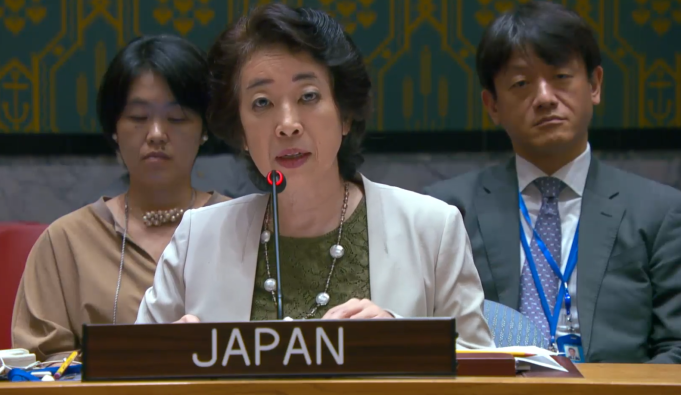西アフリカ・サヘル地域情勢に関する安保理ブリーフィングにおける志野大使ステートメント
令和6年7月12日

(As delivered)
I thank SRSG Simão for the insightful briefing.
Japan welcomes positive recent developments in the region, including in Senegal, Liberia, The Gambia, and most recently, Mauritania, notably in the fields of democracy, and the rule of law, and judicial reforms. We also welcome the peaceful completion of the Cameroon-Nigeria border demarcation in June.
At the same time, we remain deeply concerned about rising insecurity, political instability, humanitarian crises, the severe adverse effects of climate change, and stagnant socio-economic development in the Sahel region.
In this regard, the importance of the mediation efforts of the UNOWAS and its good offices role, working closely with regional organizations such as ECOWAS and the AU, cannot be overstated. We call on the countries of the region and other stakeholders to coordinate and cooperate with UNOWAS to advance regional peace and stability.
In tackling the region’s challenges, we need not only short-term solutions but a holistic approach addressing the root causes with a long-term perspective that puts human security at its centre.
On this note, I wish to highlight three points.
First on security: Central Sahel is now the epicentre of terrorism, according to the Global Terrorism Index 2024, and yes, force or physical intervention is needed to counter terrorism. However, when security forces do not respect the rule of law, human rights and international humanitarian law, people and communities cannot trust state institutions. Thus, terrorists can again exploit the societal fragility.
Second, people must have a sense of ownership in the building of a resilient society. For that, democratic representation is vital, political and civic space is essential, and inclusivity in all processes reflecting the voices of various actors, such as women and youth, is key. Regarding the transition in Burkina Faso, Guinea, Mali and Niger, it is important for international community to continue engagement with these countries, in coordination with the AU and the ECOWAS in this respect.
Third, we need to address the immediate humanitarian crisis. Humanitarian agencies are struggling to operate due to insecurity, access limitations and other logistical constraints, especially in Central Sahel. We call for full, safe, rapid, and unhindered access for the delivery of humanitarian aid to all persons in need. Japan on its part is providing humanitarian support through international organizations addressing food insecurity, providing basic services such as water and health, mitigating the adverse impacts of climate change, and assisting IDPs, refugees and host communities, among others.
Many of the region’s challenges are transnational. Japan commends regional efforts such as the Accra Initiative, the Multinational Joint Task Force, and the recent discussion to activate the ECOWAS Standby Force to tackle transnational security threats. Recognizing that terrorists take advantage of regional divisions, we encourage dialogue between ECOWAS and Burkina Faso, Mali, and Niger to safeguard the gains of regional integration.
To conclude, the Security Council must remain engaged, and Japan remains committed to contributing towards a stable and prosperous West Africa and the Sahel.
I thank you.
